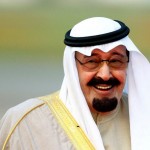King Abdullah of Saudi Arabia has died aged 90 after a short illness, state television announced late on Thursday. He has been succeeded by Crown Prince Salman, his half-brother.
The news came after the king was admitted to hospital on 31 December suffering from pneumonia. His condition was said to have improved a few days later.
Rumours of the king’s death circulated on social media before Saudi TV began broadcasting Qur’anic verses – often a sign of bad news – and the announcement was made. He is to be buried on Friday afternoon.
Beyond confirmation that Salman has ascended the throne lie troubling questions about the succession, the stability of an unreformed absolute monarchy and the prospects for its younger generation of royals at a time of turmoil in the region – including the destabilising crisis in Yemen.
Abdullah bin Abdulaziz, who had been king since 2005 and effectively in charge since his brother Fahd’s stroke in 1995, accepted limited change after 2011 in response to the Arab spring. Yet Saudi women are still not allowed to drive, citizens are unable to vote except in municipal elections and public beheading by sword remains a standard feature of the judicial system. Political parties are banned.
Salman is widely believed to be unwell, with speculation he is suffering from dementia or Parkinson’s disease, though Saudis deny that. He is 79, so there is bound to be uncertainty about his rule.
Stability and continuity are likely to be his guiding principles, at a time of alarm over the rise of Isis in Iraq and Syria, turmoil in neighbouring Yemen, the kingdom’s rivalry with Iran and controversy over its resisting calls for Opec production cuts as the price of oil has plummeted.
In recent months, Salman has begun to play a more active role and has represented the country at important meetings abroad. He also serves as deputy prime minister and defence minister.
Salman served as the governor of Riyadh province for years and enjoys a reputation for good governance. He acted as the family enforcer, discreetly settling problems with some of the thousands of royals who live in the capital. He was also active in collecting funds to support the mujahideen who were encouraged to fight the Soviet Union in Afghanistan in the 1980s – Osama bin Laden was the most famous of them – and he worked closely with the Wahhabi clerical establishment.
Salman stands to be succeeded in turn by Prince Muqrin, 69, the deputy crown prince, an RAF-trained fighter pilot and former intelligence chief whose prospects are often questioned because he was born to a Yemeni rather than a Saudi mother of “approved” tribal lineage.
If Muqrin does come to the throne, he is likely to be the last of the sons of the founder of Saudi Arabia, King Abdulaziz (Ibn Saud), who died in 1953. That will be the end of an era for a family, the Al Saud, who literally gave their name to a wealthy but autocratic country that controls 20% of the world’s oil reserves and dominates a strategic and volatile region.
US president Barack Obama saluted the late King’s commitment to close US – Saudi ties and offered condolences. “As a leader, he was always candid and had the courage of his convictions,” Obama said in a statement. “One of those convictions was his steadfast and passionate belief in the importance of the US-Saudi relationship as a force for stability and security in the Middle East and beyond.
“The closeness and strength of the partnership between our two countries is part of King Abdullah’s legacy,” the statement added.
The British prime minister, David Cameron, said: “He will be remembered for his long years of service to the kingdom, for his commitment to peace and for strengthening understanding between faiths.”
Muqrin’s position was confirmed last year by the 35-member allegiance council in a move designed by Abdullah to guarantee a smooth succession. But that manoeuvre apparently faced opposition from less prominent surviving sons of Ibn Saud, especially Prince Ahmed. That means there could still be an argument – something the Al Saud have tried hard to avoid.
![JP-23ABDULLAH-2-obit-articleLarge[1]](http://www.sjmlmedia.com/wp-content/uploads/2015/01/JP-23ABDULLAH-2-obit-articleLarge1.jpg) “I don’t think they are crazy enough to have an internal conflict over the throne,” said a Saudi writer. “The lesson is whatever you do, you do it in private and you don’t let rivalries upset the stability of the family’s rule,” argues a former diplomat.
“I don’t think they are crazy enough to have an internal conflict over the throne,” said a Saudi writer. “The lesson is whatever you do, you do it in private and you don’t let rivalries upset the stability of the family’s rule,” argues a former diplomat.
Bruce Reidel, a CIA veteran and now a Brookings Institution expert, said: “If and when Muqrin ascends to the position of crown prince, the kingdom will face the unprecedented challenge of picking a next in line from the grandsons of Ibn Saud. That will raise questions of legitimacy not faced in the last century of Saudi rule.”
Predicting events inside this large and secretive clan is notoriously difficult and often described as a sort of Arabian version of Cold War-era Kremlinology. But one clear possibility is that younger royals will demand a greater role.
Abdullah’s sons, Prince Mitab, head of the National Guard, and Prince Mishaal, governor of Mecca, both mistrust Crown Prince Salman and his “Sudairi” wing of the family, named after one of Ibn Saud’s favourite wives. Mohammed bin Nayef, the interior minister and son of the late Crown Prince Nayef, is another highly regarded figure of the same generation who is also much admired in the west.
Maintaining the family consensus will get harder the closer the younger generation get to power, experts argue.
Another issue for Salman will be managing Saudi relations with the US, the source of disappointment in Riyadh and impetuous moves by Abdullah in the last year after Obama sought to negotiate a nuclear deal and a wider rapprochement with Iran as well as failing to act militarily against the Syrian president, Bashar al-Assad, whose overthrow the Saudis are still seeking.
Saudi participation in Obama’s anti-Isis coalition may have helped ease tensions.
The Saudis – the king’s formal title is “guardian of the two holy places” (of Mecca and Medina) – bill themselves as the leaders of the Sunni Muslim world, a role that has taken on increased significance in the face of the jihadi threat and the atmosphere of sectarianism across the region.


I saw this article on other site. It had identical meaning but in a completely
different words, they use advanced article rewriter, you should read about it, just search in google:
Rynildhat’s Rewriter
When I originally left a comment I appear to have clicked the -Notify me when new comments are added- checkbox and now every time a comment is added I get 4 emails with the same comment. Perhaps there is a means you are able to remove me from that service? Appreciate it!
I’m impressed, I must say. Rarely do I encounter a blog that’s both equally educative and interesting,
and let me tell you, you’ve hit the nail on the head. The problem is something not enough people are speaking intelligently about.
Now i’m very happy that I came across this in my hunt for
something concerning this.
The FHA home loan emerged out from the Federal Housing Administration Elise Pytlovany
mr blair, one in the world’s most highly paid speakers,
reportedly commands between 50,000 and 170,000 for the single speech.
Thanks for any other fantastic post. Where else could anybody get that type of information in such
an ideal manner of writing? I’ve a presentation subsequent week, and I am at
the look for such information.
Hey very nice blog!
Hi there would you mind letting me know which hosting
company you’re working with? I’ve loaded your blog in 3 completely different internet browsers and I must say this blog loads a lot faster then most.
Can you recommend a good hosting provider at
a fair price? Kudos, I appreciate it!